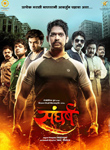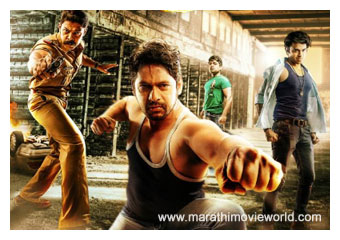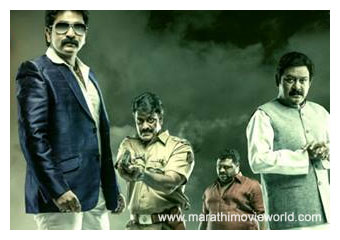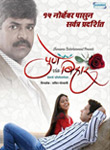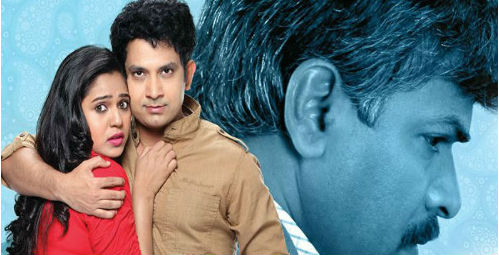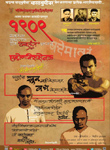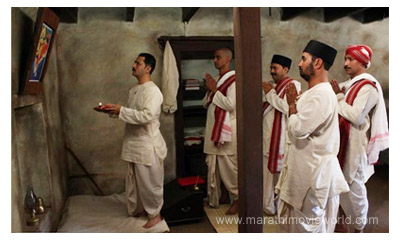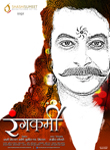‘Fandry’ delivers a strong social message
 |
Rating: ★★★ ½
Studio / Presenter: Zee Talkies Producers: Nilesh Navalakha, Vijay Kajaria Writer, Director: Nagraj Manjule Dialogues: Nagraj Manjule, Bhushan Manjule Cinematographer: Vikram Amalaadi Editor: Chandan Arora Cast: Somnath Awghade, Suraj Pawarm Rajeshwari Kharat, Chaya Kadam, Pravin Tarade, Kishor Kadam, Nagraj Manjule Movie Review by: Ulhas Shirke |
Don’t mistake this film as an adolescent love story, witnessed in the Marathi films of recent past like ‘Shala’ and ‘Time Pass’. And, if you are confused with the name ‘Fandry’, please try to understand how, people got confused with the name of Aamir Khan’s film ‘Ghajini’, which ultimately turned out to be the name of the dreaded villain in the film. By the way, in this film, ‘Fandry’ is the name of a pig, which plays a spoilsport in the life of a school going boy Jabya, belonging to lower caste and living in a village Akolner, in Western Maharashtra.
Fandry’ is the story of a boy Jambuwant Mane alias Jabya (Somnath Avghade) studying in 7th standard, who like any other boy of his age in a village, aspires to do something else, rather than continuing with his traditional Kaikidi tribe work of catching the pigs or doing odd jobs. So, he studies hard; but his adolescence aspires to win the heart of Shalu (Rajeshwari Kharat) studying in his class. It is a one sided love known to his classmate (Suraj Pawar) and few well wishers like Charkya (Nagraj Manjule), a cycle shop owner and a true sympathiser of Jabya. However, his father – Kachru ( Kishore Kadam) who is an illiterate doesn’t realise the importance of education and wants his son to help him in his work.
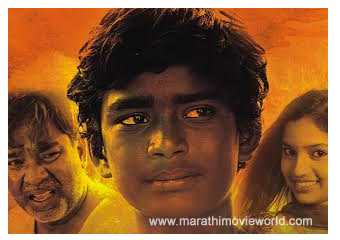
Produced by Nilesh Navalakha and Vijay Kajaria and distributed by Zee Talkies, this debut film of Nagraj Manjule is certainly not a love teen age story; but a film making a strong statement on social injustice. Clearly hitting out at ‘untouchability’ that still exists in rural India, the film is an artistic presentation to show how the society prevents the people from lower caste to come into mainstream. Every scene in this film is well crafted, be it Jabya’s belief in hunting the black sparrow, his hard work of selling Pepsi-candy in a nearby village to buy a new pair of jeans, his efforts to impress Shalu or the family’s joint effort in catching the wild pig, at the request of the village head. It required skill, to understand the ground level situation. And, the director has succeeded in doing so.
There is a scene showing the marriage talks of Jabya’s sister, which goes on to show how a poor man like his father, agrees to negotiate on dowry issue. Through the character of a boy from upper business caste, it is shown how Jabya is humiliated in the school and in village. Very cleverly the director has tried to show the scene involving the entire family of Jabya catching hold of a pig , which causes nuisance in village and which is considered as bad omen, by the upper caste. During this chase, a villager shoots a video and posts it on a social networking site; which goes on to say everything about the exploitation of such poor class and their traditional work, in our society.
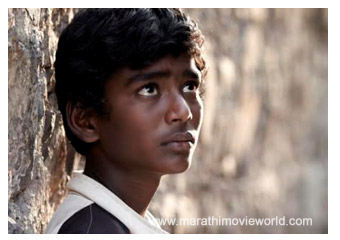
Through well written dialogues, the film does succeed in generating humour, in this otherwise thought provoking film. A metaphor has been cleverly used by the director, while showing simultaneously Jabya’s impossible hunt for a Black sparrow and his unachievable dream of coming closer to Shalu. The film concludes with a particular scene, which goes on to convey a strong social message. Only sensible film lovers would understand it. But, for those, who come to watch this film for happy ending, as seen in many commercial films; it will be a disappointment. No wonder, the film has won many awards at the international film festival .
In the role of Jabya, young Somnath Avaghade has lived up to the expectations of the director and the audience. Suraj Pawar supports him well, in his close friend’s role. Rajeshwari Kharat perfectly fits into her character of Shali; but there is no scope for her. She has very few dialogues and she doesn’t interact directly with Somnath, except for one dream sequence. Jabya’s family members look very realistic. Best performance comes from Kishore kadam, who plays his father – Kachru. This versatile actor deserves an award for his performance. Director Nagraj Manjule , who has played the role of Charkya, also invites attention. Beautiful photography by Vikram Amlady and suitable background music by Aloknanda Dasgupta, make this film more presentable.
‘Fandry’ is an artistic film with a social message. Only true film lovers would enjoy watching this film. Thanks to good marketing strategy adopted by the distributors, to invite a sizable young audience to theatres on the very first day of its release; which happened to be ‘Valentines Day’.
Action packed ‘Sangharsh’ has Bollywood flavour
|
Rating: ★★★
Studio / Presenter: Panoramic Group Producer: Vidnyan Siddhi Films Ltd. Director: Saisparsh Executive Director: R. Viraj Writer: SaiSparsh Editor: Nilesh Gawande Cast: Rajesh Shurngarpore, Amita Khopkar, Madhavi Nimkar, Nakul Ghanekar, Arun Nalawade, Prajakta Mali, Dr. Vilas Ujawane, Anshuman Vichare, Sushant Shelar, Ajay Purkar.. Movie Review by: Ulhas Shirke |
Inspired by some of the Bollywood films of Dharmendra, Jitendra, Mithunda and Sunny Deol, released during 70s,80s and 90s; director Viraj Raje, presents his action packed Marathi film ‘Sangharsh’ with a team of talented artistes form Marathi film, television and stage. Set on the backdrop of slowly diminishing chawl culture in Mumbai, the film goes on to show the unity and strength of few youngsters living in such a colony; played by Rajesh Shringarpure, Nakul Ghanekar , Anshuman Vichare and young honest Police Inspector Devdatt Nage . Together, they not only go out of their way to help people in their neighbourhood; but also foil the plan of a cunning politician Rahu dada ( Sushant Shelar) , who is a link between the corrupt Home Minister( Dr. Vilas Ujawane) and the underworld; with an eye on their chawl, for redevelopment.
Now, if there are such young handsome dynamic heroes, you need to have their girl friends too. So, you find a committed Journalist played by Sangeeta Kapure, secretly in love with Ravi Shinde- the Bhai of the chawl (Rajesh Shringarpure), a pretty girl Prajakta Mali living in the same chawl in love with Nakul Ghanekar, who aspires to become a dancer and Madhavi Nimkar (who plays the younger sister of Rajesh) in love with young well built Police officer played by Devdatt Nage. Tavlya played by Anshuman Vichare, is however shown without a girl friend, for obvious reason, as someone has to sacrifice his life; in the battle against injustice.
Then, to cook a commercial recipe, there is a kind hearted mother( Sulbha Aygurav) , whose operation is to be performed, during the period of crisis, a sincere president of the chawl committee and Tavlya’s father ( Arun Nalawade), who is always there to support the youngsters; one aunty( Amita Khopkar) , who reminds the residents of the chawl, about their duty, during the time of adversity, a corrupt Police officer( Ajay Purkar) , who tries to implicate the youngsters in a well planned criminal act, on the orders of the corrupt Home Minister and a honest duty bound Police Commissioner( Mohan Joshi) who cleverly tackles the situation, in spite of the political pressures. In this common man’s fight against corruption, finally, it is the victory of Good over the evil.
Now, with this typical commercial presentation, what is good about ‘Sangharsh’? It is the excellent team work. All these artistes, with the combination of young and experienced, have worked very hard to present their respective characters to create a strong impact of the clash for their survival. With his strong physique, gifted height and rich voice, Rajesh Shringarpure is impressive in the role of Ravi Shinde. Nakul Ghanekar perfectly fits into the role of an aspiring dancer. It is a good film debut for him. Prajakta Mali looks pretty in the song sequence; but, has very less scope to show her acting talent. Madhavi Nimkar has few emotion filled scenes, while Sangeeta kapure who plays the Journalist, looks different in every scene. To show her glamorous looks, the director has offered her a romantic song; which is picturised on both the pairs at a time. Anshuman Vichare finds his share of acting, through few emotion filled scenes.
But, as has been the practice in such films filled with conflict; there have to be strong bad men around. And, to meet that requirement, Dr.Vilas Ujawane, plays his character of corrupt Home Minister in his own style, very effectively. One fails to understand, as to why he uses a yellow cab, without any security, allowing someone to follow him; while visiting his so called sound proof place for all underworld activities? Sushant Shelar plays a comedy style of politician in a different style, impressively. In the role of corrupt police officer, Ajay Purkar looks very natural. Sulbha Aygurav, Amita Khopkar, Arun Nalawade, Mohan Joshi, have supported well through their respective roles.
Songs in this film have been picturised well with the help of a team of well known Bollywood choreographers like Saroj Khan,Raju khan, Rajiv Surti and Raju Warghese. Music and back ground music of Nishikant Sadaphule and Bapi Tutul respectively has added some flavour into this action packed emotion filled drama, neatly captured through his lenses by Sandy. Jayawant Waigankar’s art is noticed, during the dream song picturisation, involving both the couples. Dress design during the same song sequence is also worth appreciating. The second part of the film, is more gripping than the first part, for which due credit goes to clever editing by Nilesh Gawand. Action director Javed Ejaz has the same work as director Viraj Raje in this film; as it is more an action packed film, with Bollywood flavour. The fight scenes presented in this film, are no less than any Bollywood action film. Barring few errors, ‘Sangharsh’ is technically well made film.
‘Pune Via Bihar’ follows Bollywood path
|
Rating: ★★ ½
Studio: Shemaroo Entertainment Producer: Ketan Maru, Atul Maru Director: Sachin Goswami Writer: Sachin Mote, Sachin Goswami Cinematographer: Raja Satankar Cast: Umesh Kamat, Mrunmayee Deshpande, Abhay Bhargava, Sunil Kumar, Arun Nalawade, Bharat Jadhav. Movie Review by: Ulhas Shirke |
‘A’ and ‘B’ are friends from the same college for almost 4 years. ‘A’ loves ‘B’, but ‘B’ loves ‘C’. So, to make ‘B’ happy, ‘A’ goes out of his way to help ‘B’, to see that ‘B’ and ‘C’ are happily married. But, that doesn’t happen in traditional love stories. As, ‘B’ is meant for ‘A’ only. So, when ‘B’ comes to know about ‘C’ ditching her and knowing that ‘A’ really loved her through his heart; it is time for them to come together, in a typical climax. Haven’t we heard of such formula type stories in many Bollywood films? Now, through latest released Marathi film, ‘Pune Via Bihar’ we are subjected to see the repeat of that, with a touch of regional barriers.
Written by ‘Fu bai Fu’ TV show fame Sachin Mote and Sachin Goswami and directed by Sachin Goswami, ‘Pune Via Bihar’ is actually described as a love story of Abhijeet Bhosle (Umesh Kamat), a middle class Marathi student of engineering and Tara (Mrunmayee Deshpande), who is studying with him in Aurangabad. Tara is a daughter of Ramlal Yadav (Abhay Bhargava), a Central Minister from Bihar. Her father has fixed her marriage with a businessman’s natorious son, who is aspiring to become CM, with the blessings of Ramlal Yadav. Tara seeks help from Abhijeet, to run away from her home, as she wants to marry Baldev (Sunil Kumar), a final year student of MBBS. Abhijeet helps Tara to unite with Baldev, only because he is in love with her and wants to see her happy.
But, like a typical Bollywood film love triangle theme, Tara isn’t aware of his feelings for her. Abhijeet manages to release Tara from her house and brings Baldev and Tara to his home town Pune. Knowing about Tara escaping with Abhijeet, Ramlal asks Nishikant Nimbalkar (Bharat Jadhav) an encounter specialist from Maharashtra Police, to get Tara back to Bihar. Abhijeet seeks help from his father( Arun Nalawade) who is a Vada-pav vendor in Pune. When Nimbalkar reaches the venue of their marriage, Abhijeet and Tara run away from there. After this cat and mouse chase, finally Baldev is trapped by the Bihar Politician and is asked to return back, with a plan in his mind. In the meanwhile, Tara discovers Abhijeet’s love for her. All is well at the end, after witnessing a Bollywood style of climax.
From start till the end, the film does not look like a realistic gripping love story, as claimed by the film makers; for various reasons. Instead of showing a love story between a boy from Maharashtra and Girl from Bihar; the film goes on to display the love between the girl from Patna and the Boy from Ranchi. This goes on even in post interval session. It is only when, the girl tries to commit suicide, after disappearance of Baldev; that she comes to know about Abhijeet’s true feelings for her. In spite of that, she agrees to return to her home state with Baldev, who returns back. But, as we notice in majority of such love stories; there is always a last chance for the hero. And, that happens in the case of Abhijeet and Tara. The hero goes all the way to Bihar and dares to challenge the strong politician and his security, to marry Tara. ‘Everything is fair in love and war’ and that is what we witness at the end.
There are many illogical happenings in the film; such as travelling from Pune to Bihar and back by road, looks like travelling between Aurangabad and Pune. It is that easy for Abhijeet and his group and Tara’s father and brother; except for the last journey of Abhijeet by air. Then, Abhijeet’s college friends dodging and fighting with Encounter Specialist Nimbalkar and his two strong assistants, looks like a fight among their college colleagues. Even the chase scenes, where Nimbalkar and his men following Abhijeet and his group, looks like a humour filled chase noticed in comedy films. Also, Tara’s brother arriving in his car from Bihar with his goons and beating up Abhijeet’s father in his home town, looks like a typical Bollywood style action scene. At the same time, Abhijeet’s two friends stopping the mob from Bihar, entering a temple premises in their home state, in climax; looks unrealistic.
The film, however scores on account of the performances by few artistes. Both Umesh kamat and Mrunmayee Deshpande have given their best, through their respective roles. They look a perfect match for each other. Mrunmayee in particular, looks pretty good, with her mod looks. Unfortunately, it is all one sided love for the hero, almost in 75% length of this 133 mins long film. The love between two Biharis, has been stretched too long, with Abhijeet being just a mute witness to that. His character of Abhijeet looks confused, in major part of the film. In the role of PSI Nimbalkar, Bharat Jadhav suits well, but even his character looks confused on few occasions. Arun Nalawade, who has limited scope, however makes his presence felt, with his finest performance. Bhalchandra kadam and Kishori Ambiye have very limited scope, through the only wonderful musical song, in this film.
Abhijeet and Tara’s college friends have offered good support through their natural performances in this film, besides few artistes from Bihar. There is nothing much noticed in the performance of Sunil Tiwari, who has been projected as Baldev Thakur, the boy friend of Tara. Except for being at her side in few romantic scenes and few confused scenes; he is just shown by her side, in almost more than 60% of the film. And that has failed to create the desired impact of the so called love story between Abhijeet and Tara. There were lot of expectations from this film, to be an intense love story, from both the sides; depicting the culture of both the places. But, that does not happen much. Only the item song and the Fisher folk’s song, represent the culture.
At a time, when Marathi films are handling ‘out of the box’ themes; this borrowed Bollywood formula, offers a typical love triangle. Just check, whether you find any similarity with Bollywood film ‘Rangrezz’ which was also adaptation of a Tamil film. Or does it resemble with the plot of any other Bollywood film? However, Cinematography by Raja Satankar and Art Direction by Santosh Phutane are two worth appreciating factors . Music by Amir Hadkar sounds good for two songs. ‘Pune Via Bihar’ is just another love story, following the Bollywood path.
‘1909’ is a real tribute to Unsung heroes from Maharashtra
|
Rating: ★★★ ½
Studio: Shree Venkateshwara Movies International Producers: Ajay Kambli, Abhay Kambli Writer: Abhay Kambli Director: Abhay Kambli Cinematographer: Raam Allam, Imtiyaz Bargeer Music: Pradeep Vaidya Cast: Akshay Shimpi, Shrikant Bhide, Rohan Pednekar, Shreeniwas Joshi, Shubhankar Ekbote, Chetan Sharma, Amit Vaze, Sunil Inamdar Movie Review by: Ulhas Shirke |
Through our history books, we have only heard of few freedom fighters from India, like Martyrs Bhagat Singh, Sukhdev Thaper, Shiram Rajguru and Madanlal Dhingra, who during the period of 1920s and 30s fought with the Britishers; like real soldiers and willingly went into the gallows, after they were declared death sentence. But, there are few other unsung heroes from Maharashtra, way back in 1909, who were also hanged for assassinating the British Collector Jackson, from Nashik.
New Marathi film ‘1909’ is set on the backdrop of India’s pre independence struggle, during the same year in Nashik district of Maharashtra. Already oppressed by the rule of District Collector Nashik, there was already a movement initiated by Babarao Savarkar, elder brother of India’s Great freedom fighter Veer Savarkar and Anna alias Krishnaji Gopal karve, under the organisation Abhinav Bharat . The film shows in detail, how the youth from surrounding districts got attracted to this freedom movement .
‘1909’ actually talks about the sacrifice of a young collegian Anant Kanhere, who jumps into India’s freedom movement, inspired by the editorials of Lokmanya Bal Gangadhar Tilak through his newspaper ‘Kesari’ and Veer Savarkar’s translated version of Giuseppe Mazzini’s ‘Young Italy’ a political movement in Italy. He moves to Nashik, to take the revenge of the arrest and punishment given to Babarao alias Ganesh Damodar Savarkar,. He makes up his mind to eliminate Jackson, the collector of Nashik, the man behind suppressing the pre independence movement in Nashik.
When young Anant manages to join the group, through his friend from college, he comes close to the leader Krishnaji Gopal Karve and his young associate Vinayak Narayan Deshpande, a disciple of Savarkar brothers. They plan to assassinate Jackson, with their proper planning, during a play staged at a theatre, especially to honour Jackson. They do succeed in their mission; but, three of them are served death sentence. They willingly go to the gallows, turning martyrs.
There are no big stars in this film. All those who have performed, are debutants. But, they have performed their roles like experienced artistes, with perfect understanding of the situation in the story. It is a very good effort by director Abhay kambli, who is also the producer of this film along with Ajay Kambli. They have managed to rebuild that historical period on the screen. Very cleverly they have recreated the atmosphere of that period, selecting proper locations and using the right costumes for the characters.
Instead of making it a loud film, the director has paid more attention on the dialogues and actual situation arising out of a happening of an event, be it, the arrest of respectable people from the district and attaching their properties or the oppression of the rulers . In short, it is all about the youth being inspired to take part in the freedom struggle. And, he has succeeded in presenting that pre independence movement ,when the actual preparations had begun to raise the funds and import of arms.
In the role of young martyr Anant Kanhere, Akshay Shimpi has given a good performance, while Rohan Pednekar and Shrikant Bhide have given fitting performances in the roles of Vinayak Deshpande and Krishnaji Gopal karve. Others in the supporting cast, like Amit Vaze, Shrinivas Joshi, Chetan Sharma & Shubhankar Ekbote have also done well as a team. Raam Allam’s cinematography and Ashwin Vanjare’s art direction are noteworthy. ‘1909’ has turned out to be a real tribute to Unsung heroes from Maharashtra. It is a pity that this film could not find sufficient theatres in Maharashtra. Thanks to the already occupied theatres by hit film ‘Time Pass’ and those blocked by Bollywood film ‘Dedh Ishquiya’. Never Mind ! Good work is always appreciated, with a ‘word of mouth’. And, this one is from Marathi Movie World.
Last but not the least, the maker of this film, should seriously consider presenting the same theme by staging a Marathi drama with same artistes.
‘Time Pass’ offers entertainment with a timely message
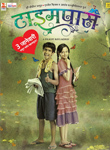 |
Rating: ★★★ ½
Studio: Zee Talkies Producer: Essel Vision, Athansh Communication Writer, Director: Ravi Jadhav Screenplay, Dialogues: Priyadarshan Jadhav, Ravi Jadhav Music: Chinar- Mahesh Lyrics: Guru Thakur Cast: Prathamesh Parab, Ketaki Mategaonkar, Vaibhav Mangle, Bhalchandra (Bhau)Kadam, Urmila Kanetkar- Kothare, Meghana Erande-Joshi Movie Review by: Ulhas Shirke |
Is teenage love affair a real love or a time pass? How many such teenage love affairs have been successful in the long run ? These are few a valid questions, posed by director Ravi Jadhav, who has in the recent past, given three hit Marathi films – ‘Natarang’, ‘Balgandharva’ and ‘Balak Palak’. In fact, his last film ‘Balak Palak’ ( BP) based on the lives of teenagers, was released in the beginning of year 2013 and now ‘Time Pass’ almost opens the new year 2014 account of Marathi films, with a neat and clean presentation of teen age love. Just two years ago, we saw a film ‘Shala’ also on teenage love; but it was more one sided. ‘Time Pass’ goes one step further, to show how love happens from both sides, without thinking much about the future prospect.
‘Time Pass’ begins with happening of love between a girl Prajakta, who has just joined college and a 10th class failed boy Dagadu, who delivers newspaper at Prajakta’s place. Prajakta’s father who works as a clerk in Central Government office, is a very strict person and keeps close watch on Prajakta’s activities after college hours. He sends his daughter for Classical Singing classes to Spruha (Urmila Kanitkar-Kothare). Prajakta who is impressed by Dagadu’s open nature and his way of living a free life, starts liking him. She even begins dating with him, only to be caught by her father one day. Besides being scolded by her parents, she is kept under strict vigilance. Prajakta is also advised by her singing teacher to give a full stop to her affair, after she comes to know about her affair.
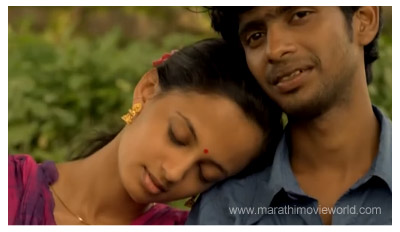
The film ends with a valuable message, clearly indicating that good education is very important to bridge the gap between “Have’s and ‘Have nots” about teenage love lasting till marriage time. More than this simple story, it is the screenplay of this film, written by Ravi Jadhav and Priyadarshan Jadhav, that makes the film more interesting in the first half. Even some of the situations in the film, like interaction of the young boy and girl in a Library, at a roadside hotel, during the wedding preparations at the marriage of Dagadu’s friend’s sister and one near the temple; are well captured to show the progress of their love.
There is a good humour filled scene, involving Dagadu and Prajakta’s father during the small birthday party of Prajakta’s brother, where Dagadu is invited by Prajakta’s brother. Similarly, the climax scene at Prajakta’s place with Dagadu being cross examined by Prajakta’s relatives, has been well presented. The film concludes giving a clear hint of ‘Time Pass 2′ displaying the words ‘to be continued’ instead of ‘The End’.
Besides presenting the humour filled teenage love story of two youngsters, very effectively, the film does leave some questions unanswered. Such as, why Prajakta’s father had continued to oppose the love between his son Vallabh with Spruha, even after both of them completing their education? If he was so much opposed to Spruha, why did he send his teenaged daughter to her place, for tuitions? How is a 10th failed student like Dagadu allowed inside the college premises ,wearing shorts and that too his friends passing comments at girls, in the college premises? In the film, there is nothing very special done by the character of Dagadu – a boy with typical poor class looks, to impress a good looking girl like Prajakta from a well to do family, except for his acting skills and guts to express his love.
His only plus points shown in the film are that he earns something for his family by delivering newspapers, attempting a road show to raise funds, by driving a bicycle for three days non stop, to repay the rickshaw loan of his father and most importantly, not crossing his limits in love. The film hints at happening of this story sometime during 80s and hence the events taking place are somewhat convincing. The film does slow down a bit in post interval session. However, the good music offered by film is refreshing, with all meaningful songs. Even the lyrics of the item song rendered in the voice of Reshma Sonavane ( ‘Vaat baghtoy rickshawala’ fame) seemed to be perfectly matching with the situation. Above all, the excellent camera work brings visual delight.
In the role of Dagadu Shantaram Parab, young Prathamesh Parab has proved that acting is all that important to effectively present an ordinary looking young boy. Perhaps he got inspiration from Dhanush’s character in ‘Ranjhana’. He has also paid more attention on his dialect to portray a perfect young boy from slums. With his simplicity displayed through this character, he has certainly invited sympathy of the audience. He is simply superb! In the role of Prajakta , Ketaki Mategaonkar is almost typecast, as we have seen her play a similar type of role in ‘Shala’. Only difference is that, this time, she tries to hide her love from her parents and feels free to reciprocate her love to her young friend. She finds two good scenes to express her emotions, as compared to Prathamesh, who has better scope.
In the role of Prajakta’s father Vaibhav Mangale has done a very good job. He has been able to generate lots of humour filled scenes, besides turning strict and emotional through few important scenes. Meghana Erande Joshi, who plays Prajakta’s mother in this film, has done well. In the role of Spruha, Urmila Kanitkar-Kothare is impressive, though she finds only two good scenes to display her acting skills. Otherwise, she is just represented as a music teacher. In the role of Prajakta’s elder brother, Bhooshan Pradhan almost plays a guest appearance, as he has nothing much to perform, except for lifting weights in Gym and displaying his biceps. Even, Bhalchandra Kadam has limited role, with only one good scene to express his emotions. The other youngsters in supporting roles offer good back up in this teenage love story. Dialogues are well written with nothing vulgar noticed. ‘Time Pass’ is an entertaining film with a timely message.
नेते होऊ पाहणाऱ्या कार्यकर्त्याचा ‘आवाज’
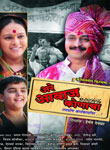 |
Rating: ★★★
निर्मिती: कॉमनमॅन फिल्मस निर्माते: चिद्विलास क्षीरसागर , हर्शल गरुड , स्वप्नील नाईक दिग्दर्शक: हेमंत देवधर पटकथा, संवाद: प्रताप गंगावणे छायाचित्रण: संजय जाधव संगीत: शैलेन्द्र बर्वे कलाकार: डॉ. अमोल कोल्हे, उदय टिकेकर, तुषार दळवी, मनोज जोशी, ऐश्वर्या नारकर, विशाखा सुभेदार , प्रतीक्षा जाधव, अथर्व कर्वे आणि इतर Movie Review by: श्रीकांत ना. कुलकर्णी |
एकेकाळी सेवाभावी कार्यकर्त्यांची आपल्या देशात कधीच वानवा नव्हती. स्वातंत्र्यापूर्वी तर तन-मन-धन देवून प्रसंगी आपल्या घरादाराचीही कसलीही पर्वा न करता समाजाच्या भल्यासाठी कार्य करणारे कार्यकर्ते होते. स्वातंत्र्यानंतरही काही वर्षे तशीच परिस्थिती होती. परंतु अलीकडच्या काळात सगळे वातावरणच बदलले. अनेक चळवळी थंडावल्या आणि कार्यकर्ता नामक जात हळूहळू नष्ट होत चालली. सामाजिक कार्यात तर आता फारच थोडे कार्यकर्ते शिल्लक राहिले असलेले दिसतात. राजकीय पक्षात कार्यकर्ते आहेत मात्र त्यांच्यातील एकनिष्ठता आणि धीर धरण्याची वृत्ती लोप पावत चालली आहे. थोडेसे जरी कार्य केले तरी त्याचा मोबदला लगेच मिळावा अशी कार्यकर्त्यांची इच्छा असते. निवडणुकीत प्रामाणिक आणि सेवाभावी कार्यकर्त्याला तिकीट मिळणे हे सर्वच पक्षात अडचणीचे होऊन बसले आहे. उलट साम-दाम-दंड-भेद असणाऱ्या कार्यकर्त्याला तिकीट मिळणे सोपे झाले आहे कारण तो निवडणूक लढवू शकतो आणि जिंकू शकतो म्हणून. त्यामुळे साहजिकच प्रामाणिक आणि सेवाभावी कार्यकर्त्यांची संख्या कमी होऊ लागली आहे. ‘अरे आव्वाज कोणाचा’ या नव्या मराठी चित्रपटात अशाच प्रामाणिक कार्यकर्त्यांची व्यथा मांडण्याचा प्रयत्न करण्यात आला आहे. चित्रपटाची कथा आणि मांडणी त्यादृष्टीने प्रभावशाली ठरली आहे. मात्र वास्तवाचा विचार करता मनात कोठेतरी अनुत्तरीत सल राहतेच.
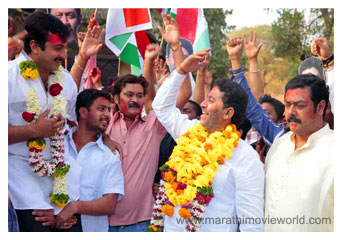
उदय सावंत (अमोल कोल्हे) हा विद्यार्थी दशेपासून अन्याय आणि दादागिरीविरुद्ध आवाज उठविणारा एक कार्यकर्ता म्हणून नावारूपास येतो. त्याची काम करण्याची धडाडी पाहून त्याला आपल्या पक्षात (गटात) ओढण्यासाठी राजकीय नेत्यांमध्ये स्पर्धा लागते. प्रारंभापासून उदय आण्णासाहेबाच्या (उदय टिकेकर) गटात असतो. मात्र अण्णासाहेब त्याचा फार हुशारीने वापर करून घेतात. उदयचे वाढत चाललेले वर्चस्व हे अनेक नेत्यांच्या डोळ्यात खुपते. त्यामुळे त्याला एका जमीन-खरेदी प्रकरणात अडकवले जाते. त्यातून उदयचे नष्टचर्य सुरु होते. मात्र तो या प्रकरणातून तावून-सुलाखून बाहेर पडतो. आणि त्याची अखेर निर्दोष मुक्तता होते.
पुण्यात मध्यंतरी घडलेल्या एका ‘लैंड-माफिया’ प्रकरणाशी या चित्रपटाची कथा तंतोतंत जुळणारी आहे. हे सुजाण प्रेक्षकाला कळल्याशिवाय राहत नाही त्यामुळेच त्यातील वास्तव लक्षात घेता संबधित नेत्याचे उदात्तीकरण करण्याचा हा प्रयत्न नाही ना अशी उगाचच शंका येऊ लागते. चित्रपटाची कथाही त्याच अभिनिवेशाने पुढे सरकत जाते. उदय सावंत विरुद्ध अनेक आरोप असूनही त्याला एकदाही आरोपीच्या पिंजऱ्यात उभे राहिलेले दाखविले नाही. शेवटी तो आरोपीच्या पिंजऱ्यात आहे
तोही स्वत:च्या बचावासाठी नाही तर कार्यकर्त्यांचा ‘आवाज’ बुलंद करण्यासाठी त्यामुळे ती बाब खटकते. परंतु एकूणच विषयाची व्याप्ती आणि त्याचे सादरीकरण पाहता चित्रपटातले ‘राजकारण’ चांगली करमणूक करून जाते. अमोल कोल्हे, उदय टिकेकर, नंदन बाळ, तुषार दळवी, मनोज जोशी, विशाखा सुभेदार, प्रतीक्षा जाधव यांच्यासह नवकलाकारांचीही कामेही चांगली झाली आहेत. संजय जाधव यांचे छायाचित्रण अप्रतिम असून गणपती मिरवणुकीसारखी समूह्दृश्ये खूपच प्रभावशाली ठरली आहेत. थोडक्यात नेते होऊ पाहणाऱ्या कार्यकर्त्याचा हा ‘आवाज’ एकदा पाहायला हरकत नाही.
‘Rangakarmi’ – When Ego clashes with Conscience…
|
Rating: ★★★
Studio: Shashi Sumit Motion Pictures Pvt. Ltd. Producers: Shashi Mittal & Sumit H Mittal Writer, Director: Sanjeev Kolte Editor: Failzal, Imran Mahadik Music: Praveen Kunwar. Cast: Dr. Amol Kolhe, Sheetal Dabholkar, Sharmistha Raut, Mohan Joshi, Prafull Samant, Devendra Dodke, Dinesh kanade, Mahesh Bodas, Deepjyoti Naik & Mrunal Gawde. Movie Review by: Ulhas Shirke |
It is a common observation to experience bad thoughts, as long as you don’t act on them. Generally, Bad thoughts keep coming, influenced by the environment and it is up to every individual to keep away from such thoughts. At the same time, Good thoughts also keep striking your mind . Acting on either of them is the choice of every individual. Latest Marathi film ‘Rangakarmi’ is about the rise and fall of a stage actor, who becomes a victim of his own thinking process.
The film cleverly communicates through two small black and white puppets, used by the actor , to express the clash of his ego with his conscience. Keshav Inamdar ( Dr. Amol Kolhe) is a struggling actor , who comes to Mumbai from his village in Maharashtra, only to become an actor. Initially, he works at back stage in a drama theatre. Being passionate about acting, he knows the dialogues of all the important characters by heart and entertains the back stage staff with his skills. His talent is noticed by a senior make-up artist Dwarkanath Kambli ( Mohan Joshi), who not only offers him shelter in his own house; but, also turns his mentor, by recommending him to play lead role of ‘karna’ in the drama on the great warrior.
Keshav, with his simplicity, not only wins the heart of Dwarkanath, but, also his daughter Minal ( Sheetal Dabholkar) and the producer Shantaram (Praful Samant). He seeks the help of Minal to improvise his clear accent, required for the plays. His talent takes him to a position, where he is required to take certain decisions about his entering the glamorous field of films. His co star Revathi (Sharmistha Raut), poisons his mind against his mentor and there comes a time, when Keshav tries to prove himself as greater than the audience. He separates from Dwarkanath and thus begins his downfall with excessive drinking. Lying on hospital bed in an emergency ward, Keshav shares his journey in this field, through flashback.
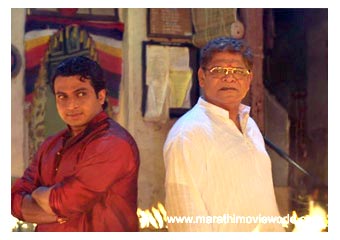
The film has an unusual subject, though it is somewhat based on the style of films like ‘Natarang’ and ‘Balgandharva’, throwing light on the real lives of a stage performer and a back stage artist . Very cleverly director Sanjeev Kolte, unfolds the journey of a young struggling actor, showing ups and downs in his life. His relationship with Senior make up artist Dwarkanath and his daughter Minal, his association with his selfish co star Revathi and his differences with his mentor.
They have been presented with perfection. But, the director has too many things to show, which results in speeding up every event in fast forward style. Instead of the patchwork of dialogues uttered by the hero, in the wing or in presence of his unit members, it would have been better, if he had made him enact the same on stage, with different get up. But, he has concluded the film very well, in the climax.
In the role of Dwarkanath, senior versatile actor Mohan Joshi has given a remarkable performance. Amol kolhe does find a suitable role to exploit his talent and he has done a wonderful job. In the role of Minal, Sheetal Dabholkar makes a good debut in Marathi films. She has played Minal with complete understanding about the character, displaying her inner feelings cleverly. Sharmistha Raut is the perfect choice for Revathi’s role and she has done a good job. Others in the character roles, have offered good support. Music by Pravin Kunvar has also played an important role, to create an environment of the 70s and 80s era. Photography is good but the art direction should have been more better.
However, looking at the sincere effort of the director to present his story and main characters, the film has turned out to be a sensible film, offering tributes to all those back stage artistes, who have served this industry with total dedication to their respective profession. More than keshav, it is the story of Dwarkanath, the make up artist, which is more touching in this film.
‘Maat’ – A Winner against all odds
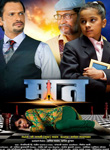 |
Rating: ★★★ ½
Studio: Sailee Dream Ventures Producer: Manali (Sudha) Sawant Director: Manohar Sarvankar Writer: Tejaswini D. Pandit Music: Dr. Saleel Kulkarni Cast: Samir Dharmadhikari, Ishaa Koppikar, Suhas Palshikar, Tejashree Walavalkar, Meghana Vaidya, Rajan Shirsatkar, Rajan Joshi, Manjusha Godse Movie Review by: Ulhas Shirke |
The famous lyrics of P. Svalaram “‘Dev Jari Majh kadhi Bhetala, Maag have te maag Mhanala; Mhanen Prabhu de Majhe Saare , Jeevan Deyi Mama balala…”. (i.e. If I meet God and he asks me what I want; I will promptly say Oh Almighty! give my whole life to my child) come to your lips. Mothers are always like that, who wish everything for their little ones, no matter, whether they have to sacrifice their own life. Latest Marathi film, ‘Maat’ is the best example of a mother sacrificing her glamour filled profession, to focus on the upbringing of her little daughter, while her own husband deserts her.
Today, Marathi films are taking up more and more social issues. ‘Maat’ is based on the novel of of Tejaswini Dinesh Pandit, which has been converted into screenplay by Sambhaji Sawant. The story of this film revolves around a young ambitious couple Ajay and Reema Deshmukh (Samir Dharmadhikari & Ishaa Koppikar) and their unsteady relationship. Reema is a successful model and beauty queen, while Ajay is a renowned structural engineer, whose wish is to make his new born daughter Mini like him.
The trouble begins, when Ajay is on a long tour. During Diwali celebrations, Reema notices that Mini cannot hear. When taken to the doctor, she is detected to be a ‘Deaf mute’ child. After Ajay returns home, he is not ready to accept the reality. He hates his little daughter and starts keeping away from his family. His own mother ( Meghana Vaidya) is not happy with her son’s attitude and stands firmly behind her daughter in law, to look after the needs of little Mini. When Mini becomes 9 year old (Tejashree Walavalkar) , she develops lot of interest in the game of Chess, besides taking active interest in drawing and karate.
Reema , who has already given up her glamour filled career, to focus her attention on her daughter, seeks help from a whimsical but talented former Chess player (Suhas Palshikar) , to teach her talented daughter. Moral support comes from common friends of the couple, who boost the confidence of little Mini. Time comes, when Mini becomes national chess champion and challenges the ‘Boss One’ Robot in US. But, after facing a tough round, She insists on her father’s physical presence, next day. And the deciding round turns out to be a stimulating climax of the film.
Director Manohar Sarvankar (Mumbaicha Dabewala’ fame) has given a lot of emotive touch to this film with sequence of events, to show how tough it is for a mother, to accept challenges to encourage her physically challenged child to win against all odds. He has shown the mother offering her full time to her daughter, in spite of the presence of her mother in law at home. The best thing about her character, he has shown is to make her daughter believe that her father is busy with his work abroad and cannot find time for the family . She also shown sending e mails to her using her husbands name.
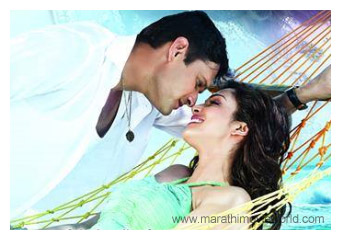
However, his idea to show a TV channel making an appeal to readers to sponsor the little Girl’s trip to US looks odd, as the identity of her ‘well to do’ parents is revealed. A well educated Ajay’s knowledge about deafness, has been shown very weak. Barring few such drawbacks, this sensible film has been presented very well, with more attention on convincing locations, costumes and realistic studio sets. Dr. Salil Kulkarni’s Music and the background music supported by suitable sound effects match very well. Bollywood cinematographer Nirmal Jani has captured the close ups and outdoor scenes skilfully, clearly displaying his expertise.
In the role of Ajay, Samir Dharmadhikari has been able to present a selfish husband. He looks a perfect choice for that role. Ishaa Koppikar, who makes her debut in Marathi, has done very well, expressing her emotions during difficult scenes; but she will have to work little more on her fluency, if she has to face competition from other Bollywood stars entering in Marathi. Her presence in this film, is a gift to Marathi films. In the role of Mini, Tejashree Walawalkar has given a brilliant performance, in spite of limitations on her speech. She has proved that the expressions and body language are all that important for a good performer. The climax scene is all hers, as she makes you shed tears. Meghana Vaidya plays a sensible mother of Ajay, with perfect understanding.
Among the other artistes in supporting roles, Suhas Palshikar steals the show. Through his whimsical nature, he has been able to bring some humour in this otherwise serious screenplay . Suruchi Adarkar also invites the attention. She has played the role of Ajay’s close friend with a lot confidence. One wonders, as to why this television actress has not received good roles in Marathi films. Rajan Shirsatkar, Rajan Joshi, Manjusha Godse offer good support through their respective roles. It was good to see former Chess Champions Praveen and Bhagyashree Thipsey in guest appearance. There is also one small scene involving Late Anand Abhyankar. ‘Maat’ has thus turned out to be a sensible film, with good performances and finest technical support. All the chess lovers, shouldn’t miss this film.
‘Khara Saangu Khota khota’ offers customary musical entertainment
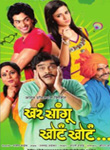 |
Rating: ★★★
Studio: Abhiruchi Films Producer: Sarav production Director: Sanjeev Naik Writer: Ramchandra Sadekar Dialogues: na Cinematographer: Manjunath Nayka Cast: Analesh Desai, Trishala Shah, Ashok Saraf, Nirmiti Sawant, Sayaji Shinde. Movie Review by: Ulhas Shirke |
At a time, when we are finding innovative themes taken up by Marathi films; Some of our Marathi film makers seem to be still believing in the traditional track of comedy, to play safe. They don’t dare to attempt something out of the box. Latest Marathi film ‘Khara Saangu Khota khota’ falls into this category. So, we have a young boy and a young girl Dushyant and Yashashree from the same village; and studying in the same college in a town. To present this traditional love story, it is needless to say that their parents are traditional political rivals, living in the neighborhood and always trying to prove their supremacy over each other, during every important event in the village.
Dushyant and Yashashree come closer during their journey back home, with a halt at Nani Saranjame’s house; when they find their accommodation by posing themselves as married couple. Actual fun begins, when they return home . Director Sanjeev Naik has chosen this humour filled plot, based on Ramchandra Sadekar’s novel ‘Tuza Majha Zamena’ to find suitable artistes to play the important characters in this film. So, besides presenting the new pair of dashing Analesh Desai and Pretty Trishala Shah in this musical entertainer, he has opted for versatile artistes like Ashok Saraf and Sayaji Shinde to play the traditional rivals- Dhadalgaonkar & Dhandle Patil respectively. To add further flavour of comedy, he has rightly chosen Nirmiti Sawant to play the commanding role of Nani Saranjame, a spinster, who runs a match making enterprise.
The sole purpose of this film has been to offer non stop entertainment, with the limited characters, providing good support with their performances. The film has good music as its plus point, for which Shrirang Aras deserves a pat. One more plus point is good photography bt Manjunath B Nayaka, who has captured some songs at outdoor locations and the fun filled climax scene very well.
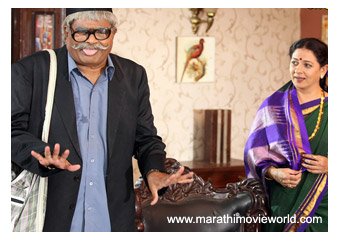
All the three senior artistes, who are well versed with comedy, have tried their best to generate instant humour with their perfect understanding, during all those scenes of confrontation in the screenplay. But, still they had to satisfy themselves, with the space extended to their characters. The chemistry of new pair of Analesh and Trishala has worked well, considering the comedy setting of the film. There are no scenes to really exploit their acting talents. Hemangi Velankar and Deepjyoti offer good support; but the other few character artistes in the film, fail to impress. They look very artificial. Even the tourist bus scene looks very outdated. The director should have tried something new, to bring the young couple together.
The screenplay of ‘Khara Saangu Khota khota’ could have been more interesting, had there been more interesting happenings, like the one noticed in the climax. It is a simple plot, to generate humour, without any vulgarity noticed. The pace of the film is also properly maintained by editing experts. Songs and music are timed well, in the screenplay. But, still you feel that there should have been more fun, in the company of the three veteran artistes. And hence, ‘Khara Saangu Khota khota’ has turned out to be just a customary musical entertainer for the entire family.
‘Mee Aani U’ presents a different love story without a grip
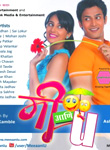 |
Rating: ★★★
Studio: Lohiaas Entertainment, Ashtvinayk Media And Entertainment. Producer, Director: Nitin kamble. Writers: Sangram Patil, Arvind Jagtap Editor: na Cinematographer: na Cast: Bhushan Pradhan, Sai Lokur, Mohan Joshi, Sayaji Shinde, Ujwala Jog.. Movie Review by: Ulhas Shirke |
We have seen many Bollywood action films inspired by Hollywood films; but, we have not seen much on Hollywood’s romantic comedy with a touch of fantasy. However, director Nitin kamble has attempted one such experiment in the latest released Marathi film ‘Mee Aani U’. Inspired by Hollywood’s 2005 film ‘Just Like Heaven’ which was actually based on original novel ‘If only it were true'; director Nitin kamble has given a different treatment, to target the young Marathi audience.
So, ‘Mee Aani U’ begins very artistically with the backdrop of animated effects and Mangesh Desai playing the narrator of this fantasy based romantic love story of happy go lucky Abhishek Chaudhary ( Bhushan Pradhan) and aspiring Journalist Ira Kurundkar ( Sai Lokur). So, it’s ‘Play Love all’ through facebook chatting, where Abhishek poses himself as Che Guevara, while Ira who uses her real name, but displays the photo of Rani Mukherjee on her timeline. Both of them agree to meet each other in person, in their hometown Kolhapur. But, before that they do come across each other at a TV channel’s office; where Abhishek grabs the job already offered to Ira, by adopting unfair practice.
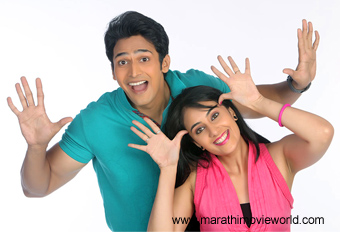
Feeling cheated by News editor Diwan( Mohan Joshi), who also happens to be a friend of her father ( Sayaji Shinde), an arms dealer in town; Ira meets with an accident while driving back home. She moves into Coma in the hospital. Ira’s father blames Diwan for this accident and hence to help his friend, Diwan deputes Abhishek on the job. Having come to know the truth about Ira, his real friend; Abhishek does all that he could do. But, he starts imagining Ira around him at home and in office. It’s actually hallucination, which sends a wrong message to others. But, Abhishek’s healing touch gives some hope to the doctor to revive Ira, who is in Coma. He convinces Ira’s adamant father to try out this therapy, to conclude the film with happy end.
Director Nitin kamble who begins the film so well, does not get good support from the limited theme and hence he keeps on attempting the hallucination effects on the lead pair, besides using the Narrator repeatedly. It is only the interaction between Sayaji Shinde and the attending doctor in the hospital and Mohan Joshi’s scenes with Bhushan Pradhan and Bhushan’s confrontation with his father at home, generate some humour. The film has used the backdrop of reality TV programme ‘Rokh Thok’ very well on three occasions, to keep some momentum in the screenplay. The climax is interesting; but lack of grip in the screenplay, makes the film look like an average entertainer.
The film however gets full marks for the fine performances coming from all the artistes. Both Bhushan and Sai have performed very naturally. Both of them look good. They receive good support from Sayaji Shinde, Mohan Joshi, Ujwala Jog and others. Sayaji, who otherwise plays a villain, finds better scope to express his emotions in this film. The technical effects have been used well. More attention has been paid on Sai’s designer clothes. Even art design during song sequences and excellent cinematography are something special. Not a bad film; but certainly would have been better, if the film maker had worked more hard on adding some more interesting situations in the screenplay.
